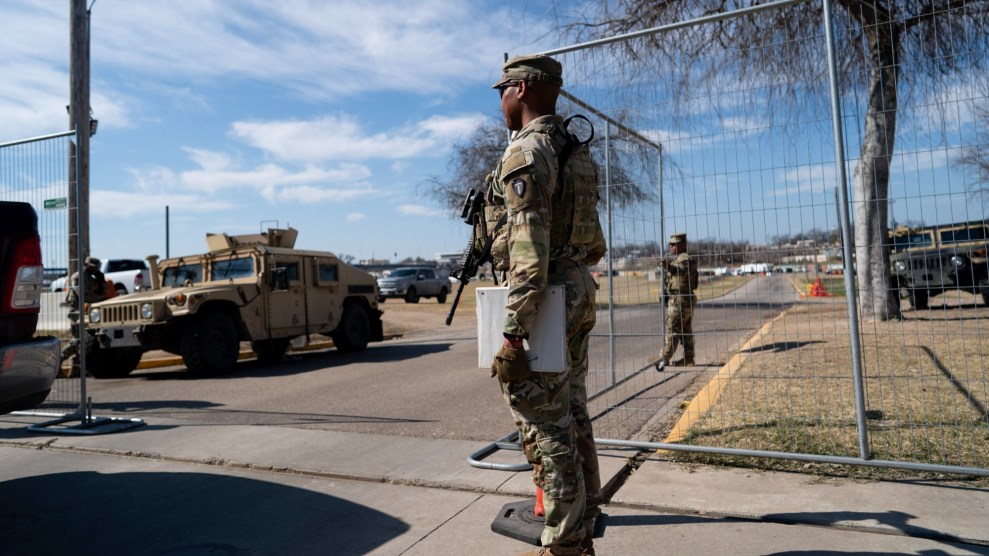
Governors Greg Abbott of Texas, Kevin Stitt of Oklahoma, and Kim Reynolds of Iowa.Bob Daemmrich/ZUMA
On April 30, Republican Gov. Kevin Stitt of Oklahoma signed HB 4156, enabling state law enforcement to arrest undocumented immigrants. The measure was, in many ways, radical. For more than a century, immigration enforcement has been almost exclusively the domain of the federal government. But, across the country, Republicans on the state level are attempting to undo settled law to take immigration policing and deportations into their hands.
The most infamous example is in Texas. In 2023, lawmakers passed SB 4, which makes it a state crime to cross the border into Texas between ports of entry. The law allows police officers to detain people suspected of entering the state illegally and empowers state judges to order deportations. (Initial punishment for a misdemeanor would carry jail time and repeat offenders could face felony charges and up to 20 years in prison.) Thomas A. Saenz, president and general counsel of the Mexican American Legal Defense and Educational Fund (MALDEF), has called the measure “the most extreme anti-immigrant state law in the last 50 years, bar none.”
And this extreme law is spreading, with copycat anti-immigration bills cropping up in Republican-led states across the country. At least nine states have considered bills mirroring SB 4 so far this year, according to the National Conference of State Legislatures. In March, Iowa Gov. Kim Reynolds approved legislation, to go into effect in July, criminalizing “illegal re-entry.” Just last month, Louisiana lawmakers pushed through a bill allowing local law enforcement to enforce immigration law.
These anti-immigration laws raise the spectrum of an infamous measure adopted by Arizona in the not-so-distant past. In 2010, Arizona enacted SB 1070, a “show me your papers” law that, among other things, required state law enforcement to determine the immigration status of people under “reasonable suspicion” of being in the country without legal authorization. Following legal challenges, the United States Supreme Court struck down several provisions of the discriminatory law—with the exception of the mandate that authorities routinely ask for proof of legal status.
Crucially, the justices concluded in Arizona v. United States that “federal power to determine immigration policy is well settled.” But Texas, and other states, are hoping to challenge the current legal framework and, if it topples, have laws ready to go to police immigration.
Oklahoma’s legislation makes it a misdemeanor punishable by up to a year in jail or a maximum fine of $500 “if the person is an alien and willfully and without permission enters and remains in the State of Oklahoma without having first obtained legal authorization to enter the United States.” (It also requires them to leave the state within 72 hours of being convicted or released from custody.)
Stitt said upon signing the bill that the measure would not give “law enforcement the authority to profile individuals.” But opponents say the new legislation is one of the most extreme anti-immigrant laws in all of the United States—weaponizing state authorities against communities of color and potentially leading to racial profiling. “Local law enforcement lacks the expertise and the constitutional authority to interpret and enforce immigration law,” the ACLU of Oklahoma said in a press release critical of the legislation.
In both Texas and Oklahoma, Republican governors have called the laws necessary amid inaction from a Democratic administration at the federal level. But the bills represent a challenge to both well-established law and constitutional provisions.
SB 4 has been embroiled in a back-and-forth legal battle. The US Department of Justice, El Paso county, and two nonprofit groups have sued the state of Texas challenging SB 4 as unconstitutional because it violates the Supremacy Clause establishing that federal laws take precedent over state acts that conflict with the exercise of federal power. SB 4, the Biden administration argued, also ignores US Supreme Court’s precedents reaffirming federal authority to regulate immigration. “SB 4 impedes the federal government’s ability to enforce entry and removal provisions of federal law and interferes with its conduct of foreign relations,” according to the DOJ.
In February, a federal judge blocked SB 4 from going into effect, ruling that the law “threatens the fundamental notion that the United States must regulate immigration with one voice.” Texas appealed and the conservative Fifth Circuit granted an administrative stay suspending the lower court’s decision. The Supreme Court later allowed Texas to enforce the law pending ongoing litigation over its legality. But then a Fifth Circuit panel placed the implementation of SB 4 on temporary hold. “For nearly 150 years, the Supreme Court has held that the power to control immigration—the entry, admission, and removal of noncitizens—is exclusively a federal power,” the court wrote.
If SB 4 prevails, immigrant rights advocates worry it could present the conservative supermajority on the US Supreme Court with an opportunity to reverse its own previous ruling. Texas Gov. Greg Abbott, whose power grab aspirations knows few boundaries, suggested as much to CNN, saying the state would “welcome a Supreme Court decision that would overturn the precedent set in the Arizona case.” He has argued that the enforcement of SB 4 is supported by Scalia’s dissent in the 2012 case, where the late justice wrote that Arizona was entitled to “its own immigration policy” as long as it didn’t conflict with federal law and found no reason why the state couldn’t make it a state crime to deport people. (Both Justice Samuel Alito and Clarence Thomas dissented in part with the majority, with Thomas’ opinion indicating he would have upheld all provisions of SB 1070.)
SB 4, Kate Melloy Goettel, senior legal director at the American Immigration Council, stated, “sets a disastrous precedent” for other states across the country to enact bills that could “result in significant civil rights abuses, leading to widespread arrests and deportations by state actors without key federal protections.”











